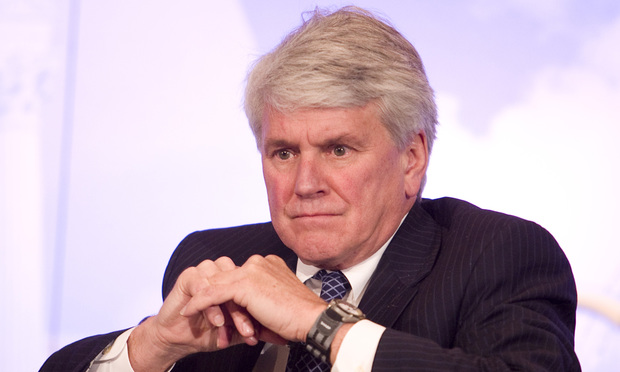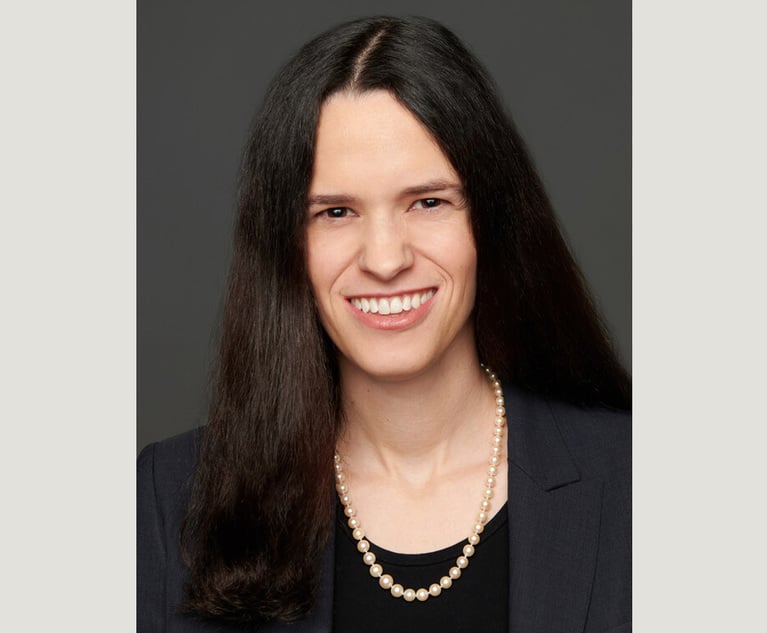'I Did Not Lie.' Greg Craig Testifies in His Own Defense at Criminal Trial
Cross-examination is set to begin later this afternoon.
August 28, 2019 at 02:46 PM
5 minute read
 Gregory Craig. Photo: Diego M. Radzinschi / ALM
Gregory Craig. Photo: Diego M. Radzinschi / ALM
Greg Craig took the stand in his own defense Wednesday as his criminal trial neared its end in Washington federal court, where the venerated lawyer and former Obama White House counsel denied he deliberately deceived the Justice Department about his past work for Ukraine.
Craig's high-stakes testimony marked the climax of a criminal trial that has gripped the legal community and cast a pall on his onetime law firm, Skadden, Arps, Slate, Meagher & Flom. The trial has dredged up behind-the-scenes details of a project Skadden took on for Ukraine in 2012 that has come to bedevil Craig and his former law firm.
In more than five hours of testimony, Craig revisited a report he prepared for Ukraine on the widely criticized prosecution of the country's former prime minister, Yulia Tymoshenko. Prosecutors have alleged that Craig misled the Justice Department about his role in the public release of the Tymoshenko report to avoid registering as an agent of Ukraine under the Foreign Agents Registration Act, or FARA, an 80-year-old law requiring the disclosure of lobbying and public relations efforts for overseas governments.
Within minutes of taking the stand Wednesday, Craig denied he lied to the Justice Department unit tasked with enforcing FARA.
"I did not lie to Ms. Hunt or the FARA unit," Craig testified, referring to Heather Hunt, the former chief of the unit who testified against him earlier in the week.
Craig was then asked by his lead defense lawyer, Zuckerman Spaeder partner William Murphy, whether he intentionally hid information from the Justice Department about his work for Ukraine.
"I did not withhold or conceal any information from the FARA unit," Craig said.
Craig has only been charged with misleading the Justice Department, not with failing to register as a foreign agent. But his prosecution has been viewed as an early test of the Justice Department's stepped up enforcement of FARA. In January, Skadden agreed to pay $4.6 million to resolve the Justice Department's allegations the firm failed to register as a foreign agent in connection with its Ukraine work.
Prosecutors alleged that Craig misled the Justice Department to avoid the perceived stigma of registering as a foreign agent and to preserve his Skadden colleagues' ability to take government positions. In avoiding a FARA registration, prosecutors said, Craig was also able to conceal the identity of the Ukrainian oligarch who secretly paid more than $4 million for the project: Viktor Pinchuk.
Craig acknowledged on Wednesday that a FARA registration would have created issues for any lawyers on the Skadden team who were interested in taking government posts. He noted that former Skadden partner Cliff Sloan and a Allon Kedem, a former associate, left the firm for government jobs after helping prepare the Tymoshenko report.
"Had they had to register as a foreign agent, that would have been a problem for them," Craig said.
Prosecutors have seized on Craig's contacts with reporters around the release of the Tymoshenko report to portray him as a key participant in Ukraine's public relations strategy. On Wednesday, Craig said his interactions with reporters went against the interests of Ukraine and were intended to correct mischaracterizations of the Tymoshenko report, which he described as independent and critical of the prosecution.
"I thought it was highly likely they were just going to kill the report," Craig testified.
Craig grew animated recalling his reaction to the messaging strategy a British public relations consultant, Jonathan Hawker, had prepared in the buildup to the report's release. Many of the plan's talking points were "flat wrong," Craig said, and caused him to distrust Hawker.
"That gave me grave concern about his integrity, his honesty and his reliability. I didn't trust him," Craig said.
The case against Craig stems from former Special Counsel Robert Mueller III's investigation of former Trump campaign chairman Paul Manafort, who is serving more than seven years in prison on charges related to his past work for Ukraine. In 2012, while serving as a top adviser to then-Ukrainian President Viktor Yanukovych, Manafort helped arrange for Craig to take up the review of Tymoshenko's prosecution.
In the cross-examination, prosecutor Fernando Campoamor-Sanchez called attention to Manafort's role in the project and the special counsel office's interview of Craig. In another exchange, Campoamor-Sanchez asked whether money was the "main reason" Craig agreed to work for Ukraine in 2012. The prosecutor pointed to an email Sloan sent Craig in 2012, ahead of a meeting in Kiev with Pinchuk, urging him not to be "bashful" about requesting a large sum.
"That was one of the reasons, I'm not sure it was the main reason," Craig replied.
"But wasn't it the primary reason?" the prosecutor asked.
"It was one of the reasons," Craig said.
Craig's cross-examination is set to continue Thursday.
Read more:
'I Just Made a Big Mistake.' Photograph Sparks Tense Exchange At Greg Craig Trial
Former Skadden Partner Cliff Sloan Reveals Unease Over Firm's Ukraine Work
'We Will Leave': Drama Over Skadden's Ukraine Billing Gets Close Up at Greg Craig Trial
Greg Craig Is Warned: Cut the Chumminess With Former Skadden Colleagues at Trial
This content has been archived. It is available through our partners, LexisNexis® and Bloomberg Law.
To view this content, please continue to their sites.
Not a Lexis Subscriber?
Subscribe Now
Not a Bloomberg Law Subscriber?
Subscribe Now
NOT FOR REPRINT
© 2025 ALM Global, LLC, All Rights Reserved. Request academic re-use from www.copyright.com. All other uses, submit a request to [email protected]. For more information visit Asset & Logo Licensing.
You Might Like
View All
In-House Moves of the Month: Boeing Loses Another Lawyer, HubSpot Legal Chief Out After 2 Years
5 minute read
After Regime Change, Syria Remains Liable in US Federal Courts for Alleged Assad-Era Terrorism Support
3 minute read

Split 4th Circuit Ruling Is a Win for Covington & Burling in US Army Base Attack Litigation
3 minute readTrending Stories
- 1Prepare Your Entries! The California Legal Awards Have a New, February Deadline
- 2DOJ Files Antitrust Suit to Block Amex GBT's Acquisition of Competitor
- 3K&L Gates Sheds Space, but Will Stay in Flagship Pittsburgh Office After Lease Renewal
- 4US Soccer Monopoly Trial Set to Kick Off in Brooklyn Federal Court
- 5NY AG James Targets Crypto Fraud Which Allegedly Ensnared Victims With Fake Jobs
Who Got The Work
Michael G. Bongiorno, Andrew Scott Dulberg and Elizabeth E. Driscoll from Wilmer Cutler Pickering Hale and Dorr have stepped in to represent Symbotic Inc., an A.I.-enabled technology platform that focuses on increasing supply chain efficiency, and other defendants in a pending shareholder derivative lawsuit. The case, filed Oct. 2 in Massachusetts District Court by the Brown Law Firm on behalf of Stephen Austen, accuses certain officers and directors of misleading investors in regard to Symbotic's potential for margin growth by failing to disclose that the company was not equipped to timely deploy its systems or manage expenses through project delays. The case, assigned to U.S. District Judge Nathaniel M. Gorton, is 1:24-cv-12522, Austen v. Cohen et al.
Who Got The Work
Edmund Polubinski and Marie Killmond of Davis Polk & Wardwell have entered appearances for data platform software development company MongoDB and other defendants in a pending shareholder derivative lawsuit. The action, filed Oct. 7 in New York Southern District Court by the Brown Law Firm, accuses the company's directors and/or officers of falsely expressing confidence in the company’s restructuring of its sales incentive plan and downplaying the severity of decreases in its upfront commitments. The case is 1:24-cv-07594, Roy v. Ittycheria et al.
Who Got The Work
Amy O. Bruchs and Kurt F. Ellison of Michael Best & Friedrich have entered appearances for Epic Systems Corp. in a pending employment discrimination lawsuit. The suit was filed Sept. 7 in Wisconsin Western District Court by Levine Eisberner LLC and Siri & Glimstad on behalf of a project manager who claims that he was wrongfully terminated after applying for a religious exemption to the defendant's COVID-19 vaccine mandate. The case, assigned to U.S. Magistrate Judge Anita Marie Boor, is 3:24-cv-00630, Secker, Nathan v. Epic Systems Corporation.
Who Got The Work
David X. Sullivan, Thomas J. Finn and Gregory A. Hall from McCarter & English have entered appearances for Sunrun Installation Services in a pending civil rights lawsuit. The complaint was filed Sept. 4 in Connecticut District Court by attorney Robert M. Berke on behalf of former employee George Edward Steins, who was arrested and charged with employing an unregistered home improvement salesperson. The complaint alleges that had Sunrun informed the Connecticut Department of Consumer Protection that the plaintiff's employment had ended in 2017 and that he no longer held Sunrun's home improvement contractor license, he would not have been hit with charges, which were dismissed in May 2024. The case, assigned to U.S. District Judge Jeffrey A. Meyer, is 3:24-cv-01423, Steins v. Sunrun, Inc. et al.
Who Got The Work
Greenberg Traurig shareholder Joshua L. Raskin has entered an appearance for boohoo.com UK Ltd. in a pending patent infringement lawsuit. The suit, filed Sept. 3 in Texas Eastern District Court by Rozier Hardt McDonough on behalf of Alto Dynamics, asserts five patents related to an online shopping platform. The case, assigned to U.S. District Judge Rodney Gilstrap, is 2:24-cv-00719, Alto Dynamics, LLC v. boohoo.com UK Limited.
Featured Firms
Law Offices of Gary Martin Hays & Associates, P.C.
(470) 294-1674
Law Offices of Mark E. Salomone
(857) 444-6468
Smith & Hassler
(713) 739-1250










